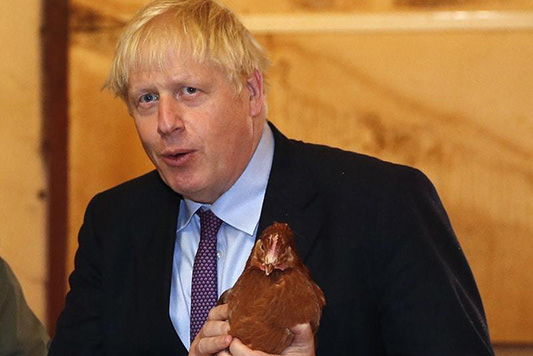The struggle for socialism is the only alternative for the working class!
The latest events around Brexit have placed Britain facing one of the most serious political and institutional crises in its history. The Tory Prime Minister Boris Johnson, endorsed by the Queen, agreed to suspend the Parliament from September the 10th to 14th October, in order to prevent the critical negotiation process that will take place before October the 31st -the deadline to reach an agreement with the EU- from being affected and further questioned.
The measure reflects the degradation of parliamentarism not only in Britain but in numerous countries where the bourgeois democracy seemed firmly well-established. It is an authoritarian and Bonapartist decision, which shows the enormous harmony of a sector of the British ruling class with Trump's program and methods, as well as other extreme right-wing populists who are ruling in countries in Europe and Latin America.
A week later, however, Johnson lost his limited absolute majority in Parliament and it was passed a law, with the vote of 27 Tory MPs, which will force the government to request an extension to the EU if there is no agreement or if the Parliament does not approve a No Deal Brexit.
Johnson has responded by expelling the 27 rebel deputies from the conservative parliamentary group, deepening the historic crisis of the Conservative Party. In this unprecedented situation, the possibility of new elections to give a way out to this crisis and to prevent the spreading of popular discontent in the streets, is gaining strength. But even such an exit also faces difficulties now with Corbyn against immediate elections until Parliament ensures fully the law to paralyze the possibility of a No Deal Brexit.
The depth of the Brexit crisis is directly related to the serious social crisis that Britain has been experiencing for decades. The reality for the working class and youth has been the collapse of their living conditions, an accelerated growth of inequality, and a generalized process of worsening of their working conditions. This is a result of the constant cuts in the welfare state, especially intense after the return of the Tories to the Government in 2010. According to a study carried out by the Joseph Rowntree Foundation in 2017, 8 million adults, 4 million children and 1.9 million pensioners live in poverty -the 20% of the population- while 3.7 million workers do not earn enough to cover their basic needs. At the same time, in 2018, the big corporations listed on the British Stock Exchange obtained a record profit of 218,000 million pounds, surpassing the previous record of the year 2011.
The unpredictable consequences of a No Deal Brexit
The perspective of a No Deal Brexit gains strength, raising pessimism and division between the British and European ruling class. In a context of commercial war between the US and China, and of a possible economic recession, this outcome would mean a devastating blow to the European Union –whose also is facing future with a question mark- and it will not solve anything.
Britain has suffered a 0.2% drop in its GDP in the last quarter, and the outlook may be equally negative for the next. As noted by David Blanchflower, a member of the Monetary Policy Committee of the Bank of England, Britain's exit from the EU "could not happen at a worse moment."
A report from the Johnson Government itself has revealed that a No Deal Brexit would imply a collapse of infrastructure, with miles of trucks stalled at border crossings. There would be a shortage of medicines, since three quarters of them are imported from Europe; of food, since Britain imports 60% of its food, mainly from the EU, and fuel. This, together with the accelerated devaluation of the pound, will imply a vertiginous rise in prices, and a situation of serious recession or even of economic depression, with GDP falls of between 5% and 8% being recorded in the coming years.
The Office for Budget Responsibility has already argued that a No Deal Brexit would imply a 30,000 million pound hole in public finances. On the other hand, on the Irish border, which is one of the main points of disagreement with the EU, the return of a hard border could lead to a situation of growing conflict sharpening the sectarian division between Protestant and Catholic communities. And according to the report, this is not the worst scenario, but the most likely, basic and realistic.
Divisions within the ruling class: With the US or with Europe?
Against the background of a growing inter-imperialist conflict, mainly between China and the US in their struggle for the world hegemony, a broad sector of the British bourgeoisie, especially financial capital and large export industries, seeks to remain in the EU, even under other conditions. However, other sectors try to align with the US and trust the possibilities offered by a free trade agreement with the American bourgeoisie, aware of the weaknesses of the EU and its subordinate role in all areas of international relations.
We have to understand that Britain's current crisis is part of the global dynamic of imperialist confrontation and overproduction crisis. Europe, as an economic and political bloc, is increasingly divided and faces increasing difficulties under the hegemony of a Germany that is also facing the effects of the recession in its industry and the decline of its exportations.
Of course, the American bourgeoisie will also want to take advantage of a possible agreement with Britain and increase its vassal role. As various internal documents of the Trump administration have revealed, this free trade agreement would imply further opening of the British market to US capital, which in the food sector would entail significant restrictions on exports to the EU. On the other hand, many public services such as the NHS (National Health Service) would be seriously threatened, as big American companies, together with the British companies, would accelerate the actual privatization plans, aggravating the serious social crisis suffered by the country.
Paradoxically, Britain would leave the EU supposedly to recover "its sovereignty" from the EU, to become practically an American colony. Something that seems acceptable to a sector of the British capitalists even if they resort to nationalist demagogy.
No to national unity! Yes to the class struggle against austerity and for a socialist Europe!
In such decisive moments, the leader of the Labor Party, Jeremy Corbyn, instead of calling for a mass mobilization and the general strike to overthrow the Tory government as an essential step to achieve a leftist government that breaks with austerity, has offered himself as guarantor of capitalist and institutional stability.
The blairites of the right wing of the Labour Party have openly proposed a government of National Unity. And the worst part is that Corbyn is echoing this strategy when, through a public letter1, he has proposed to Tory deputies who oppose Brexit, to the liberals and the greens -all pro-capitalist parties- to unite and work together to establish a technical government in order to call elections and achieve a deal Brexit or a new referendum. This is a completely wrong policy. The most striking thing is that despite these generous offerings and this aptitude of institutional responsibility, the British ruling class still does not trust Corbyn: it fears that his election as Prime Minister will encourage the struggle between the working class and youth in anti-capitalist lines.
Corbyn must break with this position of national unity with the Tories, the Liberals, and the pro-capitalist Blairists wing, which seeks to save the interests of the British capitalist class. To do this, he has to base on the that policies that made him leader of Labor, the fight against austerity and social cuts, the defense of radical social reforms in favor of the working class, or the nationalization of key sectors of the economy such as the railways, the energy sector or water supply companies.
Brexit has revealed the limitations of economic nationalism of populist and reactionary right political forces, and of traditional social democracy and those sectors of the new reformist left, such as Corbyn, Tsipras or Pablo Iglesias, who see no other way out than to remain in the capitalist EU and its democratic "reform".
In the first case, economic autarchy is completely unsustainable and is simply a fallacy. A capitalist Brexit, which respects the order imposed by large monopolies at a time of global contraction of the economy, will mean more layoffs, more exploitation, job insecurity and loss of rights. But the option of remaining in an EU that is a club at the service of the capitalist multinationals, which day by day legislates and acts against the working class, as we have dramatically seen in the case of Greece and the rest of countries, it is no “progressive” option at all.
Broad sectors of the British working class voted in favour of Brexit as a way to hit the European establishment and its anti-social agenda, reflecting the deep crisis of British capitalism. It was a real political earthquake that should have been used by Corbyn and his collaborators in the Labour Party and the trade unions to launch a political offensive on all fronts and defeat the Tories with mass mobilization.
But the “leftist” bureaucracy of Labour and trade unions has not undertaken any struggle, despite the deep division of the Tories, who see themselves plunged into an unprecedented crisis.
The lessons of these events are obvious. The only alternative is a broad mobilization of the working class and youth in defence of an anti-capitalist program to solve the serious social problems suffered by millions of British workers. In order to do this, first of all, Corbyn and the leaders of the TUC and of the main British unions have to call to massive mobilizations and a general strike to overthrow not only the reactionary Johnson government, but all the tories and all the capitalist parties in favour of austerity, and to pull back all cuts and counter-reforms approved by the conservatives since they came to power in 2010. Trade union leaders must abandon their social peace policy, which in practice has sustained the dying conservative governments of Theresa May and now Boris Johnson. Only in this way can be confront early elections in benefit of the working class, breaking with Johnson's populist and chauvinist demagogy.
A mass mobilization which would put forward a socialist program to expropriate the great capitalist monopolies and nationalize the banking system, under democratic control of the workers, is the only effective way to end poverty and growing social exclusion, unemployment and precariousness, racism, lack of public housing, and to ensure decent public health and education for the all the population. There is no solution neither inside nor outside the EU. Brexit demonstrates that it is necessary to unify the struggle against the capitalist EU on the basis of a revolutionary program to conquer a socialist Europe.
1- Corbyn’s open letter: https://www.independent.co.uk/news/uk/politics/brexit-jeremy-corbyn-letter-in-full-mps-conservative-labour-stop-no-deal-a9081146.html (“As you were one of 116 Conservative or independent MPs who voted against No Deal that day and are not on the government frontbench, I am writing to you to offer to work together, in a collegiate, cross party spirit, to find a practical way to prevent No Deal.”)





















































